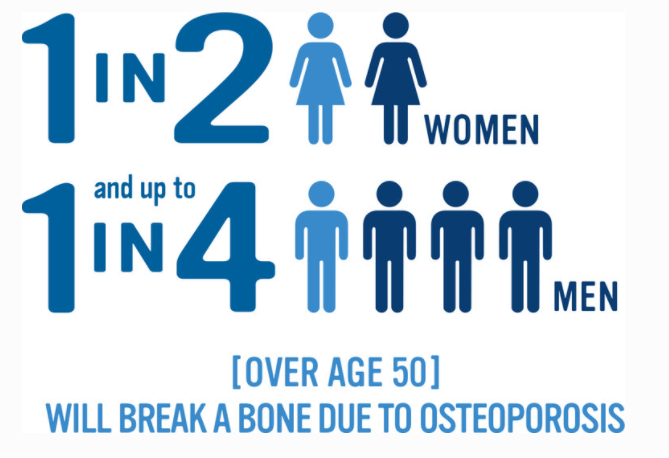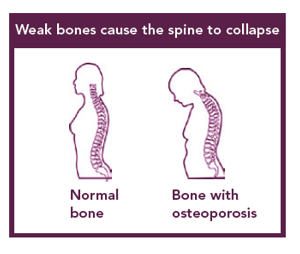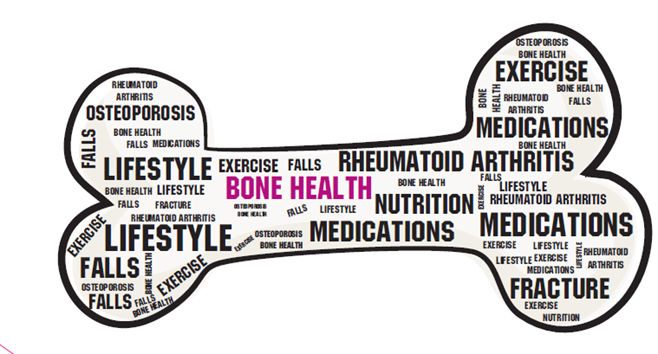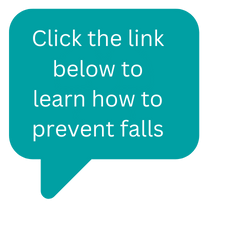BONE HEALTH & FALL PREVENTION
WHAT IS OSTEOPOROSIS?
Osteoporosis is a condition that causes bones to become thin and weak, decreasing bone strength and increasing the risk of fractures. It is often called the ‘silent disease’ because bone loss occurs without symptoms. Surprisingly often, a broken bone is sometimes the first sign that a person has osteoporosis. The most common sites for bone fractures are in the hip, spine, wrist and shoulder. Fortunately, there are plenty of steps you can take at home and with your doctor’s help to manage your bone health if you have osteoporosis.

For Screen Reader: 1 in 2 women and 1 in 4 men over 40 will break a bone due to osteoporosis

For Screen Reader: Weak bones cause the spine to collapse. Normal spine and bones depicted upright. Bone with osteoporosis shown collapsed and head and neck curved downward.
There are changes in the body that can indicate osteoporosis is developing, and should be brought to your doctor’s attention:
- Bone fractures after age 50
- Change in posture; becoming more hunched forward
- Sudden back pain
- Loss of height
RISK FACTORS FOR OSTEOPOROSIS
- Postmenopausal women
- Race (Caucasians, Asians, and Hispanics are at greater risk)
- People with small, thin body frames
- Diet low in calcium and vitamin D (vitamin d tests are available with a simple finger-stick blood sample)
- Smoking
- Physical inactivity
- Heavy alcohol consumption

There are health conditions and medications that increase the likelihood of osteoporosis.
Talk to your doctor or health care provider about what you can do to keep your bones healthy
WE WANT TO MAKE SURE YOU ARE GETTING THE QUALITY CARE YOU DESERVE
![]()
ARE YOU AT RISK FOR OSTEOPOROSIS?
- If you have had a fracture, you are at risk for another.
- Broken bones (fractures) of the spine, hip or wrist are the most common types in patients with osteoporosis
- Talk to your doctor to find out if you need a bone mineral density (BMD) test or prescription medication to treat osteoporosis. If test shows that you have osteoporosis, you will need a prescription from your doctor to strengthen your bones. Taking calcium and vitamin D supplements will not correct the problem alone.
STRENGTHEN YOUR BONES AGAINST OSTEOPOROSIS:
There are steps you can take to improve your bone health and strengthen weak bones
:
- Perform weight-bearing exercises regularly
- Eat a healthy diet
- Do not smoke or drink too much alcohol
- Take medications that strengthen your bones and avoid medications that make your bones weaker
Don’t wait until you have a broken bone to take steps to improve your bone health—you can start at any age! You can also take steps to prevent falls, including doing exercises to improve your leg strength and balance, having your eyes checked, and making your home safer.
Fall Prevention Program

PREVENTING FALLS AND FRACTURES
Falls can put you at increased risks for fractures especially if you have osteoporosis. Check your risk of falling
The National Council on Aging recommends the following to help you prevent falls:
![]()
Find a good balance and exercise program
Start an exercise program that includes balance, strength, and flexibility.
![]()
Talk to your doctor
Ask for a test to measure your risk of falling. Share your history of any recent falls
![]()
Review your medications with your doctor or pharmacist every year
Find out if any medication side effects may increase your risk of falling. Take medications only as prescribed.
![]()
Get your vision and hearing checked annually. Update your eyeglasses
Healthy eyes and ears are key to helping you stay on your feet.
![]()
Keep your home safe
Remove tripping hazards, increase lighting, and make stairs safe. Install grab bars in the bathroom
![]()
Talk to your family members
Your family can help you take simple steps to make your home safe for everyone.
Material ID:Y0020_WCM_BoneHealthWEB123E_C_03212023

